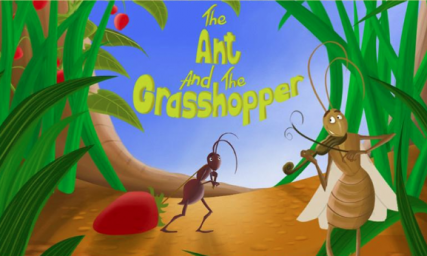The Ants and the Grasshopper
It is wintertime. The weather is cold, but the ants are doing fine. They have their warm home, and they have a lot of food to eat. They can wait for the warm weather in spring. The reason the ants have a lot of food is because they worked in the summer. So now they have grain to eat.
Grain is a kind of plant. People plant it and cut it and then they use it to make bread. The ants get the grain in summer, because that is when grain grows. The ants live in the fields where the grain grows. When the wind blows, some grain falls and the ants rush to get it. They do not eat it right then. They save it because they need to be able to have food in the winter months when plants do not grow. This goes on all summer.
The ants work hard every day. They pick up the grain, they carry it to their home. Every ant helps. Each ant carries one piece of grain. It is hard work. They carry more than they need to eat every day. They carry grain they will eat in winter, too. They play sometimes, but most of the time they work.
The grasshoppers live near the ants, and they love summer. They hop and play and they laugh at the ants. They say, “We have fun every day while you work every day. Come and play. You can get grain later.” But the ants say, “No, we have to work.”
Soon it is winter, and the grasshoppers are cold. They are hungry, too. They do not have food to eat. Since they played all summer, they did not save food for winter.
One day, a grasshopper came to see the ants and he was very hungry. “Please, ants, could you help me a little bit? I am just so hungry!” said the grasshopper.
The ants asked him, "Why didn’t you work in summer? We did. Remember, how you played while we worked? You made fun of us and said, ‘All work and no play is no good.’ Well, now we have food and you are hungry.”
The grasshopper said, "I didn't have the time. The weather was so lovely that I spent all the days singing. I couldn’t help but have fun. We had such a good time.”
The ants said, “We are sorry you have no food. We have a lot because we worked hard. You have none because you played. But, we will give you some food because we are good, kind neighbors. We want you to live, so we will help you now. But learn from us. Playing is a lot of fun. But you need to work to live.”
The grasshopper thanked the ants. The grasshopper had learned a lesson. It is fun to play, but you need to save for winter, too. You need to work if you want to eat. Next summer, he would work and play, too, just like the ants.
